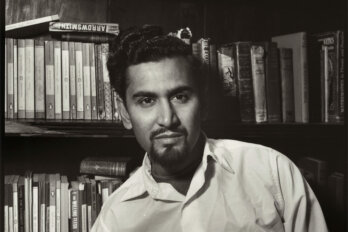God and history must have been grinning. The tape recorder wouldn’t work. Or, more precisely, it stopped working moments after the prolific Czech writer Josef Škvorecký sat down across from me in his book-filled Toronto home. He smiled through the squeaks of sped-up tape, the snapping and clicking noises of switched cassettes, my muttered entreaties and curses and apologies. Yet it did seem more natural that my conversation with one of twentieth-century Europe’s greatest dissident writers would not be recorded.
Forget grinning: God and history must have been laughing out loud halfway through the ensuing conversation, when I asked Škvorecký to say something about the notes he wrote for his new novel, Ordinary Lives. It’s his first to appear in English since 1996, and, auspiciously, its 2008 publication coincides with the fiftieth anniversary of his first novel’s publication in Czechoslovakia, and the fortieth anniversary of the Prague Spring and the ensuing Soviet invasion. My curiosity came of sensing that the notes offered far more than was suggested by their outward purpose: discursive and playful and cascading like a jazz solo in charting the vast fictional territories of Škvorecký’s oeuvre, they pass seamlessly between history, political analysis, creative reflection, and personal memory.
“I wrote the notes to inform newcomers to my fiction about my characters that travel from novel to novel,” Škvorecký told me. “And also because Canadian readers don’t know much about World War II as seen from the other side of the front lines.” He asked me what I knew of Hannah Arendt. Waving off my answer, he glossed the relevant note from the novel, explaining that she was a Nazi-era test pilot who fell in love with the Führer. In 1945, she flew to Berlin, evading Soviet anti-aircraft fire and intent upon dying beside Hitler. But she was ordered back to the air, captured by the Americans, and went on to a career in aeronautics. Before her death in 1979, she earned world records in gliding and started a series of glider clubs in Africa. Where in all of this, I wondered, was the German Jewish philosopher Hannah Arendt? Was Škvorecký playing some kind of elaborate storyteller’s joke? Was he proving just how scant a thirty-two-year-old North American’s knowledge about wartime Europe might be?
Later, I went back to the novel’s notes and realized that as I listened to Škvorecký tell stories in his raspy, soft, accented English, he had said Hanna Reitsch, not Hannah Arendt. My mistake was mundane, the difference in life stories ridiculous, the actual account of Hanna Reitsch even more ridiculous, and all of it — the history-jarring mis-hear, the ornate endnote, the bemused retelling by an eighty-three-year-old emigrant Czech writer seated in a well-appointed North American living room teeming with polyglot books and old jazz photographs — of a piece with the experience of reading and talking to Škvorecký, with encountering his grandly tragicomic insatiability for telling stories of the world in its every glory.
Born in 1924, in the provincial town of Náchod, Škvorecký began writing fiction in the late 1940s and translating American authors and writing criticism shortly thereafter. While his books were appearing in France, it wasn’t until 1958 that one of his novels was published at home. The Cowards recounts the experiences of Škvorecký’s alter ego, the earthy, jazz-playing, and woman-loving intellectual Danny Smiricky, of living in a Czech village through a jagged shard of historical time: the war was ending, the Germans retreating just as the Soviets were advancing.
Upon its publication, the book was lauded and subsequently banned — it was deemed insufficiently heroic in its representation of Czechoslovakia’s Soviet-aided escape from Nazism. The novel’s editors and publisher were fired, and Škvorecký lost his editorial position at a literary journal and did not publish fiction under his own name for five years. Situations such as Škvorecký’s attested to the starkly different reality for writers working on the far side of the Iron Curtain, as Philip Roth once observed: “The difference was in freedom, and the differences from my point of view were almost comically vivid: in my situation, everything goes and nothing matters; in their situation, nothing goes and everything matters.”
Škvorecký came to Canada in January 1969 with his wife, the singer, actress, and writer Zdena Salivarová, among the 80,000 Czechs who left Czechoslovakia after the August 1968 Soviet invasion ended the Prague Spring. He went on to be both a witness and a maker of Cold War cultural history: in 1971, he and Salivarova co-founded Sixty-Eight Publishers, which began to issue, from Toronto, works by such state-banned Czech writers as Milan Kundera, Václav Havel, and Škvorecký himself. It wasn’t until the late 1970s that his first translated novel was published in Canada. By that point, thanks to Sixty-Eight’s efforts, the appearance of his novels across Europe, and his commentary on Czech culture and literature for Voice of America, he had become an internationally prominent literary figure.
Comparable acclaim in Canada came when he was awarded the 1984 Governor General’s Award for his epic The Engineer of Human Souls (originally published in 1977). If ever there was a book that testified to the greatness of mind and heart at play in Škvorecký’s work, to the notion that the novel’s efforts at embodying the world in story should be “baroquely complex, and therefore truthful and precise,” it could well be The Engineer. It’s also a prime candidate for the great Canadian novel:
I am in bliss. At the Jarvis Street exit, the three-lane column of cars separates smoothly into two, one of them continuing along the Gardiner Expressway, the other, with me in it, no less smoothly descending the curving ramp and passing through the green light. My eye is caught by an immaculately luminescent billboard for “Breggfast” with a freckled turnip-faced brat stuffing himself with eggs done sunny side up. On an impulse I decide to consummate my feeling of well-being with supper at the Benes Inn, where they cook the best sauerbraten north of the United States border. So I turn onto Richmond and from there unto University Avenue. A few blocks later I stop for a red light, and a group of young Chinese girls in knitted woolen caps, obviously medical students, cross the street in front of me. They have faces like oriental dolls. The green light comes on. A black medical student hurries across after the Chinese and, dazzled by the headlights, she blinks the huge whites of her eyes at me. I feel as though I’m in Paradise. I am in Paradise. Nothing can unsettle me. I don’t remember ever experiencing such an evening back home. I think of Father, who also loved sauerbraten, and poor Nadia, how she would stuff herself. Had they amputated his leg, God knows how Father might have ended up. With one leg missing, Neuthaler, the judge, might simply have considered him the banal victim of an everyday car accident and Father might have gone straight to Belsen. But our absurd God plays beneficial tricks on us.
Canada as bliss, as paradise, the paradise of plentiful food and orderly traffic, of intersections and intersections: bemusement at the ease of watching hurrying pedestrians gives way to wistful, searching recollection. But more: Škvorecký, like Saul Bellow, is given to sudden reaches for higher meanings, as at the end of this passage, where an aphoristic sentence about divine intervention is all the more striking for proceeding from the dark, speculative memory of a father nearly going to the Belsen concentration camp.
Trying to summarize the storyline of this novel would be like trying to imitate a jazz orchestra with spoons. Škvorecký’s own subtitle for the book attests to its sprawling multiplicity: “an entertainment on the old themes of life, women, fate, dreams, the working class, secret agents, love and death.” It’s also a very funny campus novel, an immigrant novel, a cosmopolitan novel of ideas, and a novel shamelessly in love with its literary predecessors, whose names — Poe, Hawthorne, Twain, and Conrad, among others — provide chapter headings and motifs. Narrating again from the centre of this grand swirl is Danny Smiricky. Writer, English professor, young lover, and lover of young women, cool jazzman, clumsy saboteur of Nazi airplanes, and Cold War exile, Danny in effect tries to tell the fullest possible story of self and world out of forty years of private life and political-historical experience. In moving from boyhood to girl-mad adolescence in a small Czech town, and from there to ambivalent middle age in Toronto, from war-wracked Europe to Cold War Europe to multicultural Canada, the novel plays across endless scales of dissonant experience.
Years before writers like M. G. Vassanji and Nalo Hopkinson began vividly imagining Canada’s immigrant-remade urban landscapes, Škvorecký was depicting such landscapes with far more than the immigrant writer’s eye for the comedy and tragedy of the here-and-there. Indeed, the grandness of mind and heart that runs through The Engineer ensures that even melancholic immigrant remembrances are charged with immediate relevance. Near the end of the novel, Danny contemplates the life of his old foreman from the Nazi aircraft factory where he worked during the war. The foreman had since been imprisoned by the Communists and was facing death: “Was he terrified too? Certainly he was; everyone is.” In Paul Wilson’s searing translation, the one-word shift from past to present, from “was” to “is,” raises the perception of politically charged mortality into the general fear of death itself. As happens so many times in the novel, the passage reaches from the realm of tragic politics to the very highest and most universal order of human concerns.
In a preface to the comparatively small-scale Ordinary Lives, Škvorecký describes his characters as high school classmates “torn apart and the lives of its members uprooted by some questionable social engineering, first by the Nazi race laws…and then, after the Communist putsch in 1948, by the…brutal ‘class struggle’ that raged on, in various forms, until the late 1980s.” Those who survive reunite after 1989, having “found their lives once more flowing into the common stream of everything that lives.” The wistful language, here and throughout the novel, searches for the possibility of a meaningful shared existence beyond the grim gyres of politics and history that sharply divide the characters.
The novel consists of two sections set thirty years apart: class reunions in 1963 and 1993 that are tension filled because of the classmates’ differing postures toward the state in the intervening years. The premise of a small-town reunion is apt, given the novel’s overwhelming focus on the past, on making vivid again youthful events and experiences from the early 1940s, like buying a wedding present for a teacher, important enough for the participants to make them feel as if the grandest dramas were unfolding in a little corner of a Nazi-occupied country.
Like Faulkner’s Yoknapatawpha, Márquez’s Macondo, and Hardy’s Wessex, Škvorecký’s Kostelec is a grand recreation of his own town, a decidedly minor place to outward appearances, yet rich enough to its creator. I asked Škvorecky why he has returned to the past in Kostelec across the decades of his writing. “Because when you are a teenager, everything appears as new,” he said. “Your impressions are much stronger. Falling in love, for instance. I fell in love with my first girl when I was in prima, the first grade in an eight-grade gymnasium. A new girl came to our town, whom I later called Irene [in my fiction]. It was as if God had switched on a brilliant lamp in the skies above our drab wartime world.”
That the past remains as vivid and locally contained as it does for Škvorecký suggests the author’s strongest, most evident literary influence. As a reader, translator, and novelist, he explained, he “fell under the spell of what I used to call Faulkner’s white magic. I realized that what he wrote about was the content of the mind, the inner life of folks who might appear as very simple but, in fact, inside were as complex as people of high education.” He also admired Faulkner’s “stylistic fireworks,” and “the admixture of pop literature” — like detective and pulp fiction — one finds in his otherwise densely modernist work. Škvorecký has himself written or co-written (with Salivarová) a series of detective novels, and he explained the odd circumstances of his first reading the genre.
“At thirty-three, and newly married, I spent four months in the infectious ward of a hospital — no visitors,” he said. “People could send you books, and my friends did send me books, but because it was an infectious ward the books were non-returnable. The literary works my friends were able to part with without breaking their hearts were old detective novels.” He took to them, not surprising given the alternatives: “True, the hospital had a library, but it was full of Lenin and awful socialist-realist fiction.”
That Škvorecký more substantively took to Faulkner, given his description of the revealing work the Mississippian did for the inner lives of outwardly simple people, is not surprising; as I read Ordinary Lives, Sartre’s famous account of the experience of reading Faulkner — like sitting backwards in a car driving forward — repeatedly came to mind. Much of the novel’s substance depends, in Danny’s words, upon “what many had discovered before me, that the source of everything in man is the past, and then everything is utterly forgotten.” In one of the novel’s strongest passages, Danny tells the story of Brunhilde Brunnenschatten-Cvancarova, his ethnic German teacher who marries an ethnic Czech during the Nazi occupation of Czechoslovakia. Her students give her a fancy coffee grinder as a wedding gift, and Danny writes her a poem in German, but neither is of help when the newlyweds must decide how to avoid the consequences of her act of Rassenschande, of having “committed a racial misdemeanour” as her new, lesser-Aryan husband bitterly puts it. With Danny listening in, neighbours offer various suggestions — divorce, pregnancy, the husband’s abandoning his nationality for his wife’s — for the couple to avoid being sent to the camps for polluting Aryan bloodlines.
Brunhilde is open to the second option, a doctor’s, but then assumes the child would be taken away from her. The doctor predicts otherwise:
“By that time the circumstances will be quite different. In the fall, the Germans will have other things to worry about. In the worst case…by then you’ll be breastfeeding and that can be declared essential to the health of the child for at least two years. And by that time…”
“I hope you’re right,” [she] sighed.
The notion of having a baby and then breastfeeding in hopes of surviving until a better turn in a world war is pristinely logical in a world of absurdist first principles, where the state’s bruising reach far exceeds its rationales.
Such absurdities seem to figure in the novel’s late invocation of “indifference, the kind [Danny] had only experienced in Canada when I realized, with a sensation of bliss, that nothing could happen to me there…Indifference, our mother, our salvation, our destruction.” Once more, Škvorecký reaches from the quotidian to higher things, from signalling the comparative ease of life a Cold War exile might find as an immigrant in a place like Canada, to a more abstract formulation of humanity’s relationship to indifference itself.
In conversation, he explained that he’d first used this triad of indifference in his 1963 novel The Emöke Legend, which he refines when Danny observes, “Today I’d exclude destruction, and I’m not even sure anymore that indifference is our mother. But it is certainly our saviour.” Why, I asked him, does indifference retain its saving power? “If you were not indifferent, in a certain sense, in the days of Nazism or Communism, you would go mad,” he answered. “Because there were so many victims, you accepted it as a hard fact of life. Nobody weeps reading about six million dead, but if you read the story of one concrete, individual person, you can have a rapport with that person’s suffering. The greatness of literature is that it can move you that way.”
The moving final lines of Ordinary Lives reach beyond both indifference and suffering to a mystical plane. Danny describes the melancholy beauty of a “black mountain looming darkly over the town under a heaven full of stars,” before beginning to pray himself to a dreamless sleep in the timeless language of the Church: “Praeceptis salutaribus moniti et divina institucione formati, audemus dicere: Pater noster…” I asked Škvorecký if this interplay of heavenly sky, Latin prayer, and dreamless sleep suggested a culminating moment of serenity for his alter ego. “Yes,” he answered. One breath later, he countered, “or of giving up hope.”
Then he started in on another story from the deep past, about an uncle who was a priest. At the end of the war, when the American troops came to liberate his town, the priest had a chat in the ancient language with a GI while hiding behind a tank during a firefight. “Yes, Latin under fire,” he said, smiling at my disbelief. His answer to my final question was the answer of a modern European writer whose life and half century of books testify to the brutalities and absurdities that can come of a world governed by reducing the baroque amplitude of human life to servile singularities. It was an answer that, like much of the greatness that is Škvorecký, was vigorous with the soulful, comical, transcendent power of truth telling through telling stories.






